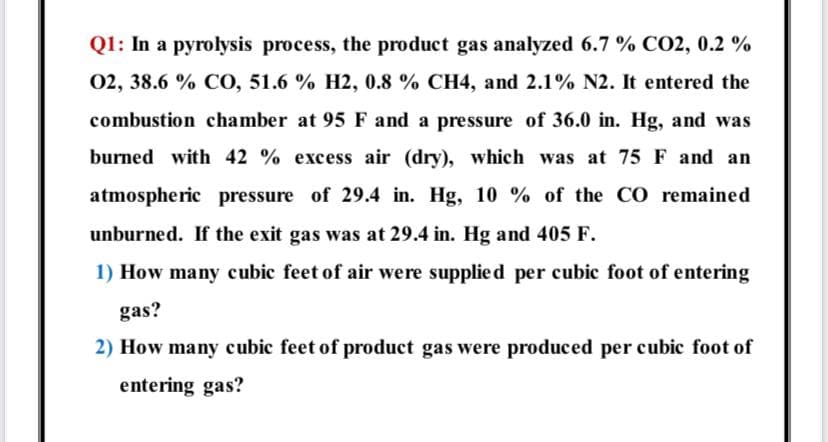Q1: In a pyrolysis process, the product gas analyzed 6.7 % CO2, 0.2 % 02, 38.6 % CO, 51.6 % H2, 0.8 % CH4, and 2.1% N2. It entered the combustion chamber at 95 F and a pressure of 36.0 in. Hg, and was burned with 42 % excess air (dry), which was at 75 F and an atmospheric pressure of 29.4 in. Hg, 10 % of the CÓ remained unburned. If the exit gas was at 29.4 in. Hg and 405 F. 1) How many cubic feet of air were supplied per cubic foot of entering gas? 2) How many cubic feet of product gas were produced per cubic foot of entering gas?
Q1: In a pyrolysis process, the product gas analyzed 6.7 % CO2, 0.2 % 02, 38.6 % CO, 51.6 % H2, 0.8 % CH4, and 2.1% N2. It entered the combustion chamber at 95 F and a pressure of 36.0 in. Hg, and was burned with 42 % excess air (dry), which was at 75 F and an atmospheric pressure of 29.4 in. Hg, 10 % of the CÓ remained unburned. If the exit gas was at 29.4 in. Hg and 405 F. 1) How many cubic feet of air were supplied per cubic foot of entering gas? 2) How many cubic feet of product gas were produced per cubic foot of entering gas?
Introduction to Chemical Engineering Thermodynamics
8th Edition
ISBN:9781259696527
Author:J.M. Smith Termodinamica en ingenieria quimica, Hendrick C Van Ness, Michael Abbott, Mark Swihart
Publisher:J.M. Smith Termodinamica en ingenieria quimica, Hendrick C Van Ness, Michael Abbott, Mark Swihart
Chapter1: Introduction
Section: Chapter Questions
Problem 1.1P
Related questions
Question

Transcribed Image Text:Q1: In a pyrolysis process, the product gas analyzed 6.7 % CO2, 0.2 %
02, 38.6 % CO, 51.6 % H2, 0.8 % CH4, and 2.1% N2. It entered the
combustion chamber at 95 F and a pressure of 36.0 in. Hg, and was
burned with 42 % excess air (dry), which was at 75 F and an
atmospheric pressure of 29.4 in. Hg, 10 % of the CO remained
unburned. If the exit gas was at 29.4 in. Hg and 405 F.
1) How many cubic feet of air were supplied per cubic foot of entering
gas?
2) How many cubic feet of product gas were produced per cubic foot of
entering gas?
Expert Solution
This question has been solved!
Explore an expertly crafted, step-by-step solution for a thorough understanding of key concepts.
Step by step
Solved in 7 steps

Knowledge Booster
Learn more about
Need a deep-dive on the concept behind this application? Look no further. Learn more about this topic, chemical-engineering and related others by exploring similar questions and additional content below.Recommended textbooks for you

Introduction to Chemical Engineering Thermodynami…
Chemical Engineering
ISBN:
9781259696527
Author:
J.M. Smith Termodinamica en ingenieria quimica, Hendrick C Van Ness, Michael Abbott, Mark Swihart
Publisher:
McGraw-Hill Education

Elementary Principles of Chemical Processes, Bind…
Chemical Engineering
ISBN:
9781118431221
Author:
Richard M. Felder, Ronald W. Rousseau, Lisa G. Bullard
Publisher:
WILEY

Elements of Chemical Reaction Engineering (5th Ed…
Chemical Engineering
ISBN:
9780133887518
Author:
H. Scott Fogler
Publisher:
Prentice Hall

Introduction to Chemical Engineering Thermodynami…
Chemical Engineering
ISBN:
9781259696527
Author:
J.M. Smith Termodinamica en ingenieria quimica, Hendrick C Van Ness, Michael Abbott, Mark Swihart
Publisher:
McGraw-Hill Education

Elementary Principles of Chemical Processes, Bind…
Chemical Engineering
ISBN:
9781118431221
Author:
Richard M. Felder, Ronald W. Rousseau, Lisa G. Bullard
Publisher:
WILEY

Elements of Chemical Reaction Engineering (5th Ed…
Chemical Engineering
ISBN:
9780133887518
Author:
H. Scott Fogler
Publisher:
Prentice Hall


Industrial Plastics: Theory and Applications
Chemical Engineering
ISBN:
9781285061238
Author:
Lokensgard, Erik
Publisher:
Delmar Cengage Learning

Unit Operations of Chemical Engineering
Chemical Engineering
ISBN:
9780072848236
Author:
Warren McCabe, Julian C. Smith, Peter Harriott
Publisher:
McGraw-Hill Companies, The